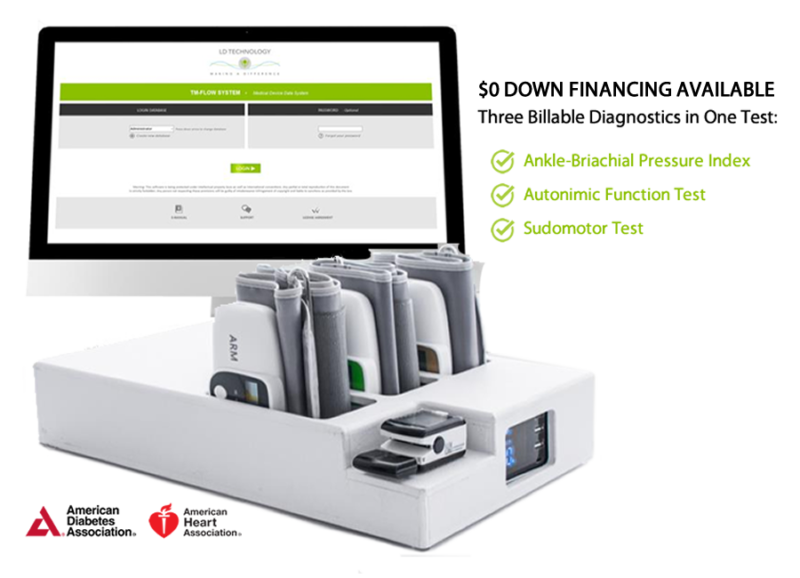Frequently Asked Questions
The TM Flow device offers numerous benefits for medical practices, including non-invasive and accurate testing, early detection of autonomic and arterial dysfunctions, and comprehensive diagnostics that reduce the overall cost of patient care. Additionally, the device’s tests are easy to bill with multi-code diagnostics, making it a valuable investment for enhancing patient care and optimizing practice efficiency. It also supports compliance with standards of care recommended by leading health organizations.
Yes, the TM Flow device is covered by Medicare and most private pay carriers. Specific CPT codes, such as 95921 for cardiovagal innervation and 93923 for ankle-brachial pressure index, ensure that the diagnostics are easy to bill. Coverage and reimbursements may vary depending on the Medicare locality, but the comprehensive diagnostics offered by the TM Flow device are widely recognized and supported by insurance providers.
Autonomic nervous system testing is crucial for diabetes and cardiovascular patients because it helps in the early detection of autonomic neuropathy, which is a common complication in these conditions. Early detection through ANS testing allows for timely intervention and management, reducing the risk of further complications. The American Diabetes Association recommends ANS testing as a standard of care for patients with Type 1 and Type 2 diabetes, highlighting its importance in effective diabetes management.
The TM Flow device is an advanced, non-invasive diagnostic tool designed to perform a series of tests that aid in the identification and early detection of autonomic nervous system (ANS) and arterial dysfunctions. It provides quantitative assessments of the ANS, helping to distinguish between early and late stages of autonomic neuropathy. The TM Flow device is particularly valuable for cardiovascular and diabetic autonomic neuropathy (DAN) testing, making it an essential tool in diabetes management and cardiovascular assessments.

TM Flow in Chicago
The TM Flow is a tilt table test machine that allows us to measure the autonomic nervous system accurately in both healthy and ill patients. As the patient reclines and subsequently reclines at a precise angle, we are able to elicit symptoms of autonomic dysfunction with the use of tilt table testing. Symptoms including dizziness, lightheadness, difficulty breathing, palpatations, and blurry vision. We also detect abnormal sweat production called a sudomotor response during this tilt table testing. This additional information allows us to properly diagnose many conditions such as POTS (Postural Orthostatic Tachycardia Syndrome), Dopamine Responsive Dystonia, Neuropathy, and more
What is a Tilt Table Test?
A tilt table test is a way to measure the autonomic nervous system. The autonomic nervous system is responsible for regulating many functions in the body that we don’t have conscious control over, such as heart rate, temperature regulation, and digestion.
A tilt table test can be used to diagnose many conditions including panic disorder or postural orthostatic tachycardia syndrome (POTS). It’s also used to detect abnormal sweating by measuring sudomotor response.
The TM Flow is a tilt table test machine that allows us to measure the autonomic nervous system accurately in both healthy and ill patients.
Tilt table testing is a non-invasive, safe and effective way to measure the autonomic nervous system using an indirect measurement of blood pressure, heart rate and respiratory rate. Tilt table testing can be used to diagnose many conditions including: syncope (fainting), neurocardiogenic syncope (NCS), vasovagal syncope, postural orthostatic tachycardia syndrome (POTS), dysautonomia, cardiovascular disorders such as hypertension and congestive heart failure and autonomic failure related to Parkinson’s disease or multiple system atrophy.
The TM Flow is a tilt table test machine that allows us to measure the autonomic nervous system accurately in both healthy and ill patients. The TM Flow has software capabilities which allow us to analyze more than 100 parameters simultaneously in real time during one session with high accuracy levels thanks to its proprietary algorithms developed by our team of engineers over many years working with physicians worldwide who have given feedback on what they need from their equipment so that we could design it so that these professionals could easily perform their tests at home without having having expensive equipment brought into their offices every time they need it
As the patient reclines and subsequently reclines at a precise angle, we are able to elicit symptoms of autonomic dysfunction with the use of tilt table testing.
When you’re on a tilt-table test, the table will be tilted backwards at an angle of 30 degrees. This allows gravity to pull blood out of your legs and into your chest. When this happens, your heart rate increases and your blood pressure drops. This can happen if you have orthostatic hypotension or neurocardiogenic syncope (NCS). With NCS, there is a lack of awareness that something isn’t right with blood flow from head to toe. Orthostatic hypotension is more common than NCS.
Symptoms including dizziness, lightheadness, difficulty breathing, palpatations, and blurry vision.
The TM Flow tilt table is a tilt table test machine that allows us to measure the autonomic nervous system accurately in both healthy and ill patients. A subject is tested while lying down on the bed and then tilted up to 45 degrees with the help of hydraulic lifts. Once the subject’s body has been tilted at a 45-degree angle, we can measure his or her heart rate variability (HRV). By looking at this data, we will be able to determine whether or not you have POTS.
Symptoms including dizziness, lightheadedness, difficulty breathing or palpatations are common symptoms associated with orthostatic intolerance; however there are other signs that may be present as well including blurry vision or cognitive dysfunction (difficulty concentrating).
We also detect abnormal sweat production called a sudomotor response during this tilt table testing.
When the body is not in control of its temperature, it will attempt to cool itself down by producing sweat. This is called a sudomotor response and can be tested with tilt table testing.
The autonomic nervous system controls this process. When it malfunctions and you have too much or too little sweating, it will affect your blood pressure as well as your heart rate.
This additional information allows us to properly diagnose many conditions such as POTS (Postural Orthostatic Tachycardia Syndrome), Dopamine Responsive Dystonia, Neuropathy, and more.
This additional information allows us to properly diagnose many conditions such as POTS (Postural Orthostatic Tachycardia Syndrome), Dopamine Responsive Dystonia, Neuropathy, and more.
The TM Flow is the most accurate tilt table available today. As the patient reclines and subsequently reclines at a precise angle, we are able to elicit symptoms of autonomic dysfunction with the use of tilt table testing.
Tilt Table Testing with TM Flow can help diagnose causes of many illnesses.
Tilt table testing with the TM Flow is a safe, reliable and noninvasive way to measure sudomotor response, autonomic nervous system function, and other types of stress responses.
These tests can help diagnose causes of many illnesses including migraines, fibromyalgia and chronic fatigue syndrome. They are also used in research settings to test responses to medications or exercise interventions.
Conclusion
Tilt table testing has been proven to be one of the most effective methods of diagnosis for autonomic dysfunction. It is also one of the only ways that we can measure a sudomotor response, which can help us diagnose many conditions such as POTS (Postural Orthostatic Tachycardia Syndrome), Dopamine Responsive Dystonia, Neuropathy and more. With this information in hand, it is clear that having access to tilt table testing in Chicago, IL will benefit many patients by helping them receive proper care from an expert physician who understands these conditions
RSS FEED
- The TM Flow is a highly reimbursable diagnostic in Portland, OR
- Pain Clinics in Albuquerque, NM Adopt the TM Flow as Gold Standard
- Neuropathy in Philadelphia, PA can be detected with the TM Flow device
- Pain Management Clinics in Dallas, TX are Using the TM Flow to Diagnose Symptoms
- Unlocking the Potential of ANS Testing: Insights for Healthcare Providers
- Neuropathy clinics in Savanah, GA use the TM Flow
- Come to Charleston, WV to Get a TM Flow
- How the TM Flow will maximize your physician practice in Boise Idaho
- Doctors in Pittsburg, PA are using the TM Flow for the treatment of neuropathy
- Which Patients Require ANS Testing?
